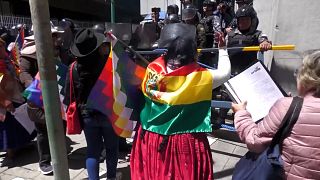Bolivia
To the rhythm of drums, cymbals, rattles and trumpets, hundreds of dancers marched Tuesday in front of the Bolivian government palace to defend the morenada, an Andean folk dance of uncertain origin, declared a cultural heritage by Peru last week.
Costumes full of sequins and multicolored masks combined with the thunder of drums under the midday sun that burned the Plaza Murillo, in the historic center of La Paz.
The dispute over the dance, which dates back to colonial times, was reignited after Peru this month declared it a "cultural heritage of the nation" and "one of the 'ambassadors' of the artistic culture of Puno," a region bordering Bolivia in the Lake Titicaca area.
The Bolivian government reacted hard to the measure adopted by the neighboring country. The minister of culture, Sabina Orellana, declared during a press conference that the ministry would go to Unesco to "defend" these rhythms, which "are the identity of all Bolivians".
The Peruvian ministry of the culture clarified however that the declaration "does not manifest nor affirms the right of exclusiveness or the denomination of origin of the dance, or of any character of our origins altiplano".
Summoned by the government of Luis Arce, dozens of groups of morenada and of caporal, another contested traditional dance, arrived in the Bolivian capital from diverse regions of the country to express their discontent in front of the supposed "appropriation" of the tradition by Peru.
In front of the Palacio Quemado, the seat of the Bolivian government, the morenada troops delighted those present - including the Minister of Culture, the Minister of Education Adrian Quelca and the Italian ambassador Francesco Tafuri - with the characteristic slow and orderly swaying from left to right and right to left, from shoulders to feet.
According to historians, the choreography of the tired rhythm is reminiscent of the pain and suffering of the slaves upon their arrival in America.
In Bolivia, the morenada is one of the icons of the carnival of Oruro, celebrated every year in February, and is part of the religious festival of the Lord Jesus of great power in the city of La Paz. Both have been declared cultural heritage of humanity by Unesco.
President Arce said on Twitter that Bolivia "agrees" with Unesco's statements about the two festivities that "have delighted the planet, but above all, have universalized Bolivian culture".
Peru, as for him, celebrates every year in February the feast of the Virgin of Candelaria, of which the morenada is the protagonist.
'Andean practices'
According to the historian Julia Elena Fortún, this dance was born in black slave brotherhoods that satirized their masters by dancing the minuet, a rhythm of French origin popular in the European courts of the 17th century. They re-enacted these "simulacra" at religious festivities, dancing to a mixture of African and European instruments.
Later, members of the indigenous Aymara nation adopted this dance and incorporated blackface masks to preserve its essence.
"These are dances that transcend the borders of nation-states," said Bolivian anthropologist Juan Fabbri. They are part of "an Andean culture, an Andean philosophy, Andean practices," he added.
This is not the first time the Andean region has been involved in a dispute over folklore. In 2009, Bolivia threatened to take the matter to the International Criminal Court in The Hague after the Peruvian candidate for Miss Universe paraded in the contest in the costume of the diablada, a dance common to the highland countries.
Besides the protest, the gathering on the Plaza Murillo had a festive side: it marked the 20th anniversary of the declaration of the carnival of Oruro as "masterpiece of the oral and immaterial heritage of humanity" by the Unesco.
"Jallalla, Bolivia!" shouted someone from the audience when the last authority finished speaking. In Quechua and Aymara, it means "Long life!".
AFP













01:17
UNESCO inscribes 26 new sites on World Heritage list
02:19
Parkinsons patients report better balance after capoeira classes
02:19
Morocco sees surge in Chinese tourists
Go to video
Paraguayan town celebrates vibrant Kamba Ra'anga festival with masks, fire and tradition
02:19
US funding cuts threaten youth programmes at Kenya's Kakuma refugee camp
01:00
Inti Raymi sun festival returns to Peru's Andes with vibrant ceremony